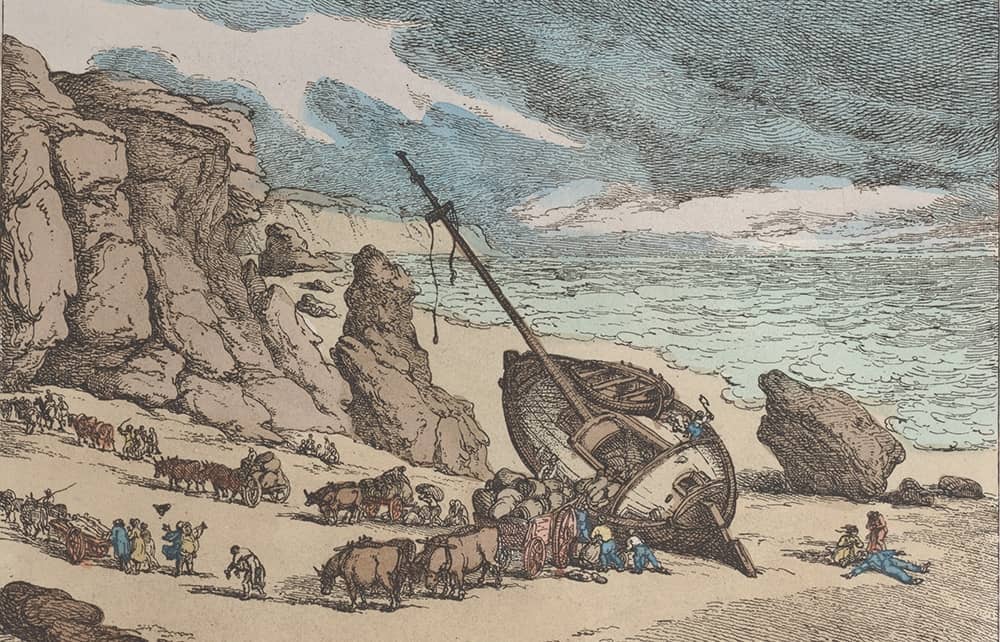In the garden of my house in Cornwall there is a smooth granite stone about the size and shape of a goodly pumpkin. In the middle, where the stalk would be, there is a hole filled with rusting iron. The day I moved in, a neighbour told me that the hole was drilled and filled with molten iron to attach a hook, long since rusted away, to make a ‘sinking stone’. Smuggled cargo could be submerged just off shore if there were any danger of meeting King George’s men, to be harvested when the coast was clear.
About a year later, another Cornish neighbour saw it and told me that, actually, the hole was for an iron hook by which the stone could be hung from a pilchard press – a large bellows-shaped contraption which squeezed as much of the evil-smelling oil out as possible, so the fish could be preserved and exported to the Continent where there was a readier market. I want to believe that my house was a smugglers’ base of operations, but sober reflection – and the house next door being called ‘The Old Pilchard Works’ – led me to the sad realisation that the second amateur historian was probably right.
Londoners tend to believe everything they’re told by Cornish fishermen down at the Swordfish or the Star
Most books about Cornwall make a choice of which of these tendencies – the Jamaica Inn or the Genuine – they are going to tack towards. There is a habit among writers from London to take the chair in the Swordfish or the Star or some other fishermen’s pub, and believe everything they’re told. (Or, if they don’t believe what the fishermen say, ignore it – like the author who wrote 300 moving pages about the noble workers in the contemporary fishing industry and didn’t once mention their views on Brexit.)
At the start of The Draw of the Sea it looks as though Wyl Menmuir is of the Jamaica Inn tendency (the first chapter is about ‘wreckers’, alluding to the most Jamaica-Inn trope of all). But it becomes clear (more slowly than strictly necessary) that by wreckers Menmuir means beachcombers, collectors and litter-pickers, and he has no interest in false lights luring sailors on to rocks (perhaps because, as a sailor, he knows that false lights drive ships away from rocks). Instead of the cargoes of wrecked ships bought at the price of blood, these wreckers collect dogfish cases and lobster tags and the offcuts of fishing nets, unidentifiable shards of plastic or, thrillingly, identifiable plastic remains (‘That’s Action Man’s arse!’) And the charm of the book is that you share in the thrill: the romance of the Genuine speaks just as strongly in Menmuir’s words as the more obviously sensational.
He would clearly love to believe the evolutionary theory of the aquatic ape – the idea that at some point our ancestors lived in the sea – but he knows it’s nonsense, even though Darwin believed it. Instead, he explores the different ways in which people can be drawn to the sea, content to leave it a mystery why they are drawn – and perhaps the mystery is the point. There is more than one reason we call it the Deep.
In each chapter we see the sea through another group’s eyes, from surfers and wildlife-watchers to beach artists and freedivers, 13 in all. The number seems ill-favoured –Menmuir is good on the superstitions of seafarers, and treats the belief that babies born en caul are never lost at sea with considerably more respect than Darwin’s evolutionary frolic – but one of the threads running through the stories is that the sea can provide solace for ill luck.
That is certainly true for Menmuir himself, and most of the others who hear the clear call that cannot be denied. John Masefield’s ‘Sea-Fever’ is quoted several times, while Covid fever lurks in the background. One of the cruellest things I saw during the pandemic was the anger against those who didn’t stop swimming (allegedly because this somehow endangered lifeboatmen) and stories of women whose mental health relied on cold-water swims having their clothes stolen to teach them a lesson. Puritanism, of course – and this book shows exactly why they kept on going down to the sea again.
The best compliment I can pay The Draw of the Sea is that the moment I finished it I signed up for lessons with the local sailing club.






Comments